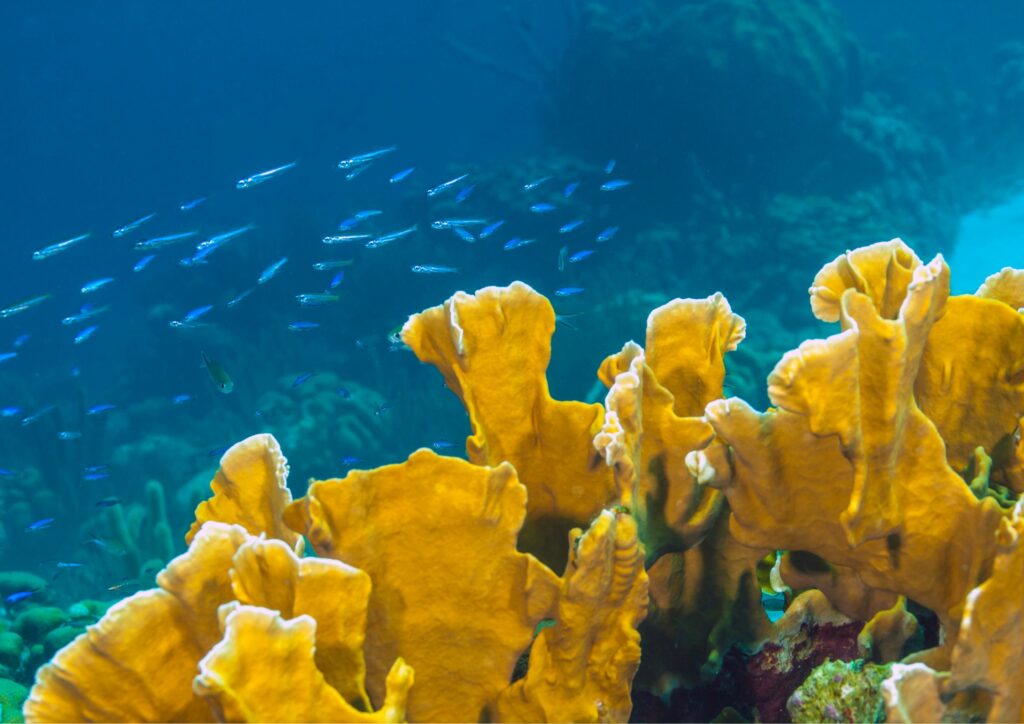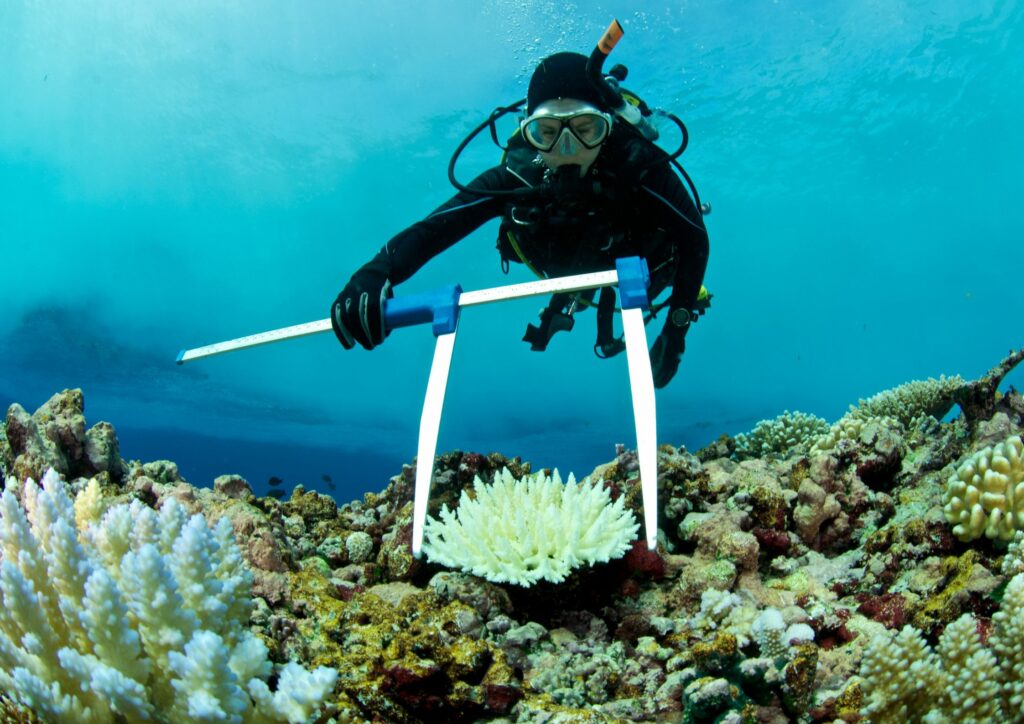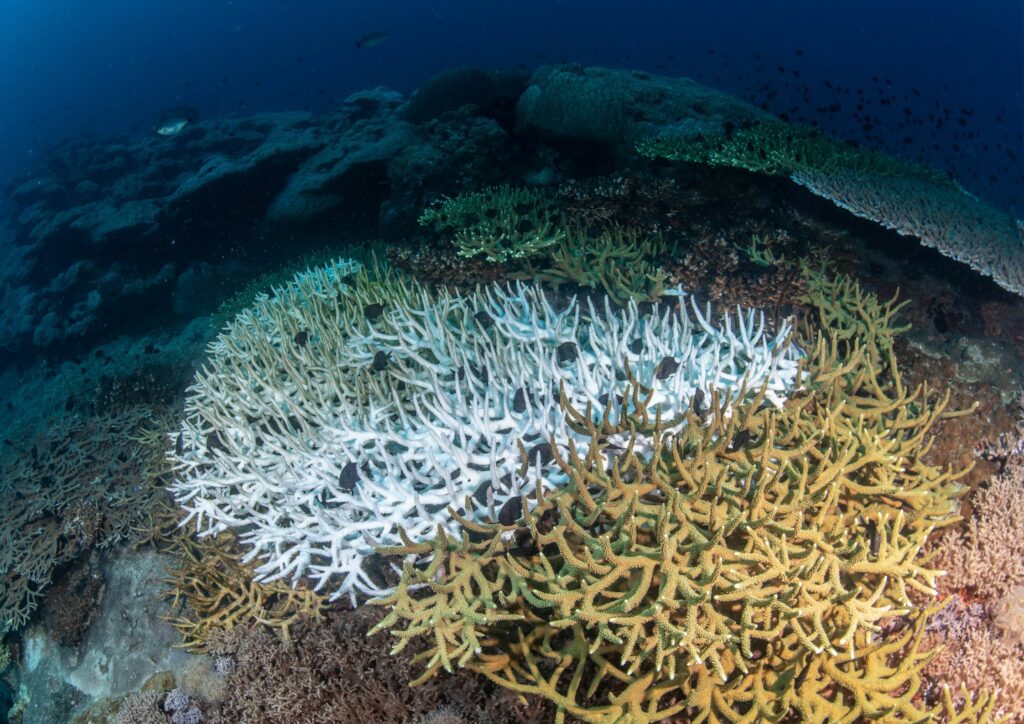Coral Conservation is a big project, imagine diving into the ocean, expecting to be greeted by a vibrant undersea city teeming with diverse life forms, only to find a desolate ghost town where coral skeletons substitute skyscrapers. This is not a scene from a post-apocalyptic movie but a harsh reality many aquatic ecosystems are facing today.
Coral reefs, often regarded as the ‘rainforests of the sea,’ are in grave danger due to numerous factors such as climate change, overfishing, and pollutants. However, hope is not lost. Coral conservation is a burgeoning field of science that promises to breathe life back into our oceans. In this blog post, we’ll guide you through the three essential steps to kickstart a coral conservation program focusing on coral gardening, coral breeding, and coral restoration.

Step 1: Coral Gardening – Cultivating Our Underwater Eden
Coral gardening, which serves as the cornerstone of any coral conservation initiative, mirrors the same principles of a land-based nursery, symbolizing the careful nurturing and cultivation of young corals. This critical step entails fostering nascent corals’ development in meticulously controlled environments, akin to tending to young saplings in a nursery. Prospective coral gardeners must establish a strong foundation of knowledge in identifying viable donor corals, which exhibit good health, robustness, and resistance to various diseases.
The selected corals are delicately fragmented into smaller, manageable pieces that are subsequently attached to unique subaquatic structures, aptly named ‘coral trees.’ These fragmented corals, deemed coral ‘seedlings,’ are carefully monitored and nurtured over the course of six to twelve months until they achieve maturity. Progress is continuously evaluated for signs of diseases and the overarching environmental conditions within the water assessed to ensure they are conducive to optimal coral growth.
Step 2: Coral Breeding – Sowing The Seeds Of Life for Coral Conservation
Coral breeding parallels the delicatessens of a heartfelt romance unraveling under isolation of the sea, it encompasses triggering the reproductive cycle of corals to release their eggs and sperm into the water column. This intricate endeavor can occur either unmolested in the wild during natural spawning events or in a more controlled setting within laboratories.
The precious eggs and sperm, once collected, are carefully amalgamated under strictly controlled environments to foster the creation of larvae. Upon reaching maturity, and having developed the ability to attach themselves to substrates, they are transported back to their natural habitat onto the reef. The overarching objective lies in amplifying the genetic diversity within populations of coral and cultivating strains that exhibit resilience against the adverse implications of changes in climate.
Step 3: Coral Restoration – Rejuvenating Our Marine Metropolises

An integral component of the coral conservation journey is coral restoration, this entails reinstating matured corals from the nursery environment back into the wilderness of the sea. Corals that were carefully nurtured within the nursery are now attached to degraded parts of the reef using specialized underwater adhesives or cement.
Over a period, they foster an environment conducive to their growth, ultimately forming large, interconnected colonies that breathe life back into the deteriorated reefs. This process, foundational to coral restoration, creates a thriving habitat for varied marine life, thereby reinstating the lost biodiversity and reviving the overall health of the ecosystem. The success of coral restoration profoundly hinges upon consistent monitoring and maintenance to confirm that the newly introduced corals retain good health and remain unharmed from external threats.
Revitalizing Oceans’ Pulse: The Powerful Role of Coral Conservation
As we’ve learnt now, starting a coral conservation program is not a one-step process, but it’s a series of carefully orchestrated steps including coral gardening, coral breeding, and coral restoration. Through this holistic approach, we have the power to counteract the decline of coral reefs, breathing new life into our oceans, and ensuring they continue to support a multitude of life forms.
Our oceans are not just bodies of water; they are the pulsating veins that nourish our planet. By championing coral conservation, we are not only preserving biodiversity and marine ecosystems but also securing our future on this blue marble we call home. Let us strive to safeguard these marine metropolises together and help revive Neptune’s underwater garden to its former glory.

This post is a great reminder of the importance of protecting our oceans. The images are stunning and really bring home the scale of the problem. I’m looking forward to learning more about coral conservation.
Hi Aisha Kamarudin, thank you for your thoughtful comment and enthusiasm about coral conservation! We’re thrilled to hear that the images have resonated with you and motivated you to learn more about this important topic. At Gill Divers, we believe that education is a powerful tool in promoting ocean conservation. If you’re interested in learning more about coral conservation, please don’t hesitate to reach out to us at [email protected] or give us a call at +65 6734 9373. We’d be happy to provide you with more information and resources on this topic. Thanks again for your comment!
I’m really impressed with this post! The information on coral conservation is so thorough and well-explained. I especially liked the section on coral gardening, it’s fascinating to see how they cultivate young corals.
Thank you so much, Kavita! We’re thrilled to hear that our post on coral conservation resonated with you. The process of coral gardening is indeed fascinating, and it’s great to see people like you taking an interest in the importance of preserving our oceans’ ecosystems. At Gill Divers, we believe that education and awareness are key steps towards creating positive change. We’re proud to be part of the coral conservation movement and hope to inspire others to join us in this endeavor. If you have any questions or would like to learn more about coral conservation, please don’t hesitate to reach out. Our team is always happy to help and provide guidance.
I’ve always been interested in marine biology, and this post has really opened my eyes to the work being done on coral conservation. The concept of coral gardening is so cool! I’d love to learn more about it.
Dear Ling Wong, Thank you for taking the time to read our blog post on coral conservation! We’re thrilled to hear that you found it informative and interesting. Coral gardening is indeed a fascinating field of study, and we’re happy to share more information with you. At Gill Divers, we’re passionate about promoting ocean conservation and sustainability. If you have any questions or would like to learn more about our initiatives, please don’t hesitate to contact us at +65 6734 9373 or [email protected]. We’d be delighted to discuss this further with you! Best regards.